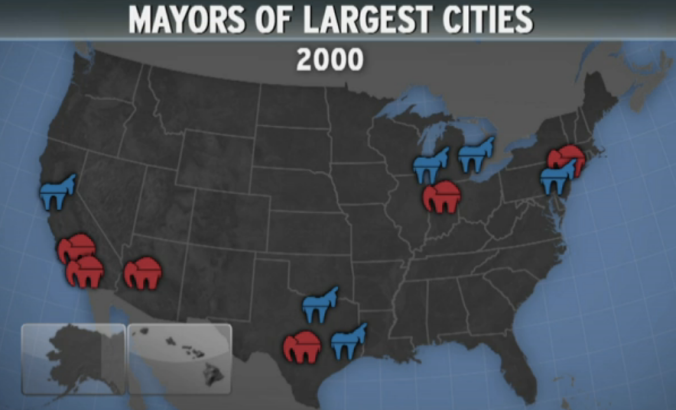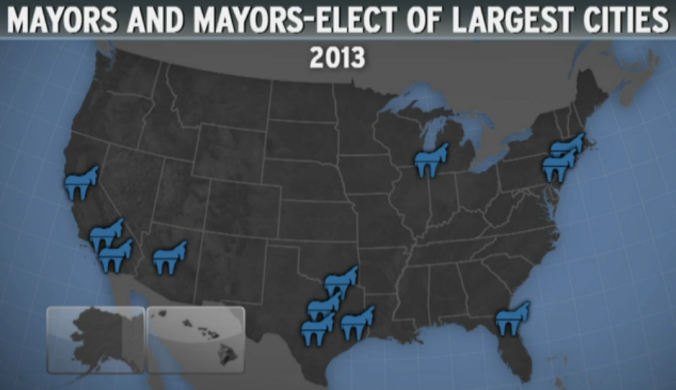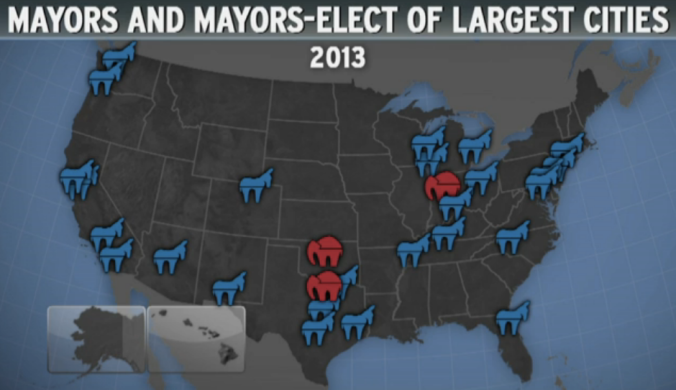 It’s been too long since we’ve had a political post hasn’t it? Last week, as part of my “Urban Lessons” mini-series, I wrote on how cities are perhaps the fountainheads of everything that ends up in suburban and rural areas. The things that take place in cities, it seems, always ends up flowing outward into the rest of the country, even if it takes decades or generations to do so.
It’s been too long since we’ve had a political post hasn’t it? Last week, as part of my “Urban Lessons” mini-series, I wrote on how cities are perhaps the fountainheads of everything that ends up in suburban and rural areas. The things that take place in cities, it seems, always ends up flowing outward into the rest of the country, even if it takes decades or generations to do so.
I had that on my mind when watching this segment of The Rachel Maddow Show from Monday night’s episode. The segment is based off an excellent piece by Alexander Burns in Politico called “GOP big-city mayors vanish”. In it, Burns writes:
Largely unnoticed in Washington, urban Republican politicians have emerged over the last year as perhaps the nation’s most severely endangered political species, as the party has either failed to compete for high-profile mayor’s offices or has been soundly rebuffed by voters. It’s a significant setback that some Republicans view as an ominous sign for the GOP in a country growing steadily more urban and diverse.
This is crazy. Look at these maps, all of which are stills I took from the Rachel Maddow clip. This first map is the party breakdown in the year 2000 among the mayors of the 12 largest cities. (As is tradition, the Red Elephants are Republicans and the Blue Donkeys are Democrats.) You’ll see it’s split evenly, 6-to-6.
Now, after the elections last week, this is what the new mayoral map looks like of the top 12 cities again.
Weird, isn’t it? It gets worse. Look at this map of the current mayoral situations of the top 30 cities in America.
Yeah, only 3 out of 30 have Republican mayors. Why is this? Well, the Politico article interviews a slew of people–even several Republican mayors–who feel the Republican Party in general has abandoned cities to set forward a social and ideological agenda in Washington. Agree or not, but either way, there is the perception that if you don’t win the cities, you won’t win the country. Burns writes:
[If] Republicans are going to compete in national elections five or 10 years from now, they’ll have to find a way to snap their losing streak in the cities.
Marist College pollster Lee Miringoff… said the GOP dilemma should be all the more alarming because the issues driving urban politics have increasingly spilled over into surrounding metropolitan areas.
“The suburbs are not this homogeneous, anti-tax, anti-crime rim around the cities that they might have been 20 years ago…. The cities have become incredibly diverse and the problems…are issues for that area as well.”
In other words, as I said last week, what happens in cities flows out to the surrounding areas. So go the cities, so go the country. The article speaks of the incredibly wide perception that Republicans have largely abandoned Urban America.
I want to make this clear, I’m not trying to make any particular political statement here. Whatever party you flirt with, you should want them to have a presence in the city and to work for its good. There have been great mayors urban in this country from all parties (even Independent). No matter what Southern and Midwestern conservatives think, there’s nothing inherently liberal to cities.
Especially in today’s climate where financial constraints are the main issue limiting cities, fiscal conservatives should be easily gaining mayoral offices across the country. The opportunity is there. Cities have not simply turned Democrat and become closed off from Republicans. The GOP seems to have turned away from urban concerns.
But beyond the current urban presence (or lack thereof) of Republicans, if what I wrote last week is true and this trend is maintained, then there is a strong likelihood they will get pushed out of more and more of the country. And that’s bad for all of us.
No matter what you think of our two-party system in general, and Republicans in particular, we need various perspectives present in the halls of power in this country to make us work. We need different opinions and disagreements and debate to hold our leaders accountable and sharpen their policies and directions.
I’m telling you: you don’t want your favorite party to have an absolute, unchallenged presence in any major, influential segment of society–especially our cities. It is to the betterment of all parties involved, including and especially the cities themselves, for there to be urban leaders from all different places on the political spectrum.
So please, GOP, wise up and do whatever needs to be done to love some cities well. Again, I repeat: don’t go in to change them, but to serve them. And Democrats, don’t simply rest on your laurels either. We’re watching you.




Well said Paul. I love to challenge you, but I agree with almost every aspect of this post. It’s interesting to see what happened in New York. Bloomberg went from Republican to Independent, and yet even his swivel wasn’t enough for the City. From what I can gather, mayor-elect Bill de Blasio basically built a platform that was intentionally somewhat in opposition to Bloomberg and quite progressive – “a tale of two cities”, etc.
LikeLike
Yes! I can finally stop blogging as my one goal in it has been accomplished 😉
LikeLike
Hey Heath! Care to add anything to the comment below?
LikeLike
This is an interesting post. I agree with your premise from last week, but I’m not sure that I agree with this. Culturally speaking, I definitely think that what starts in cities flows out to the suburbs, exurbs, and finally to rural areas. Culturally, very true. Politically, though, I think we’ve actually seen a regression in the past decade in rural America – far from losing power, rural America has fostered politicians and leaders that are further right than their predecessors from a decade ago – Ted Cruz, Darrel Issa, Steve King, Sarah Palin. I think what we will see in the coming years is not so much a shift towards more Liberal an Democratic politics in rural areas but a growing gap in our politics.
LikeLike
True, the big unknown here is if this is an oddity or the sign of a larger trend. But, the same goes for these far-right politicians. We don’t know if they are the products of deeper trends, or simply the one-term over-reactions to huge cultural and economic shifts in the past decade (all of those politicians, save for Palin, are in their first term still). Thinking about that list you gave, though, I just noticed that none of those politicians have major urban areas around where they represent (maybe Austin for Cruz?), and so these urban trends will (a) take a much longer time to reach their areas than places like New York and Arizona, and (b) not be of any effect or importance to them.
I wonder if Virginia is not more representative than Texas, Iowa, or Alaska. They used to be a decidedly red state (that I can remember), but it was due to SUBURBS like Fairfax being filled with people that work in the Blue CITY of DC that has ended up shifting that state’s politics.
(Hey, I just looked up Darrell Issa’s district. I never knew he represented a district in California, much less a part of San Diego county. So, this throws a wrench in my original scheme. Except, perhaps, because San Diego has been consistently Red for decades until the anomaly that was Biob Filner. We’ll see who replaces him, though I think the last I heard, the Democrat was in the lead. Relatedly, the 2012 re-districting process gave Issa less of San Diego, which is potentially participating in this blue-shift. So, gerrymandering could be a whole other dynamic in this GOP urban neglect, political polarization, partisan shift thing going on. Thanks for commenting and letting me wonk out.)
LikeLike